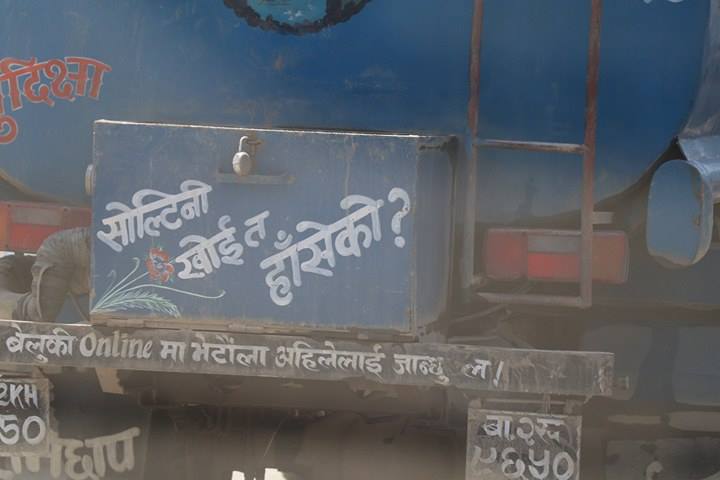Pritha Khanal, Kathmandu, Nepal, SSH Blog Correspondent

There is a common practice of writing slogans or pieces of poems on the back of trucks in Nepal, often called “truck literature”, and it has been making us laugh long before online “memes” became popular. Most of the literature hilariously imitates the native tongues and is filled with sarcasm, while some lines succeed in touching your heart in case you are going through some emotional turmoil.
On the other hand, some lines provoke rage and make you wonder why it is acceptable to write these words which have a clear motivation of mocking women and girls. Are the inappropriate comments the drivers pass not enough — they also have to write these things in huge letters on the back of the tanker? What is it that they want to prove and what message is that they want to convey?
As I was travelling with my family last weekend, I came across this water tanker with these words written with the usual purpose of making everyone laugh (“Darling, Why not smiling?”). I don’t know which part of the line was supposed to be humorous but my instant response was: What the hell is funny in these lines? Why should any “Soltini” (a kinship term where sister of a bride is Soltini to the brother of a groom) smile just because it reads so on the truck?
Things like these which are so common and ignored sometimes really depict what is inherently wrong in the society. In the name of humor and healthy flirting, there are often wrong messages spreading in society. In fact, some Nepalese culture actually cherishes the healthy flirting among their kins and community just like Solti-Soltini, which is good because it keeps the charm in the family alive and it happens with the consent of two adults along with their family. But when the behaviour is done to other girls with the motive of mocking them and making them uncomfortable, it becomes a form of harassment. Just like these lines sound very casual, it is one of the worst comments a girl has to face in the street. It feels creepy and makes us insecure when we hear the words in the street, in the market by a passerby or the groups of guys hanging around the teashops. What makes people think that writing such lines in the public vehicle is appropriate or creative?
Street harassment is part of the chronic form of violence against women. When a boy finds it comfortable and “cool” to tease a girl in the street, he may feel it is okay to grope her or inappropriately touch her in the street.
So how is this “truck literature” related here? It’s because they are written by the ones who are used to passing such comments in the street. They are written by the same drivers/ assistant drivers who laugh with each other when a girl they intentionally harassed frowns her brows but is helpless to react anyway. The same individuals who believe a girl wearing tight shirt is asking for an eagle’s eyes in her cleavage and those wearing short pants are calling for harassment. These lines are the work of harassers and for the harassers. They are funny to those who find i’ts okay to tease in the cheesiest tone and expect that the girl finds it funny too. Some would laugh hard at the lines and replicate the same to other girls while some would just casually shrug it off. But, rarely one would realize that it may be words of encouragement for fellow harassers and one more girl in the street would be hearing the words.
So what are the measures? Not everyone can stop the vehicles in the heavy flow of traffic and rant against the lines to the driver. But one can discourage such acts. Let us condemn such lines. Let us not promote messages which give the impression of harassment but rather encourage drivers to use such widely visible and effective space for delivering better messages.
Pritha is doing her Master’s degree in Anthropology and her thesis is on the menstruation practice issues among rural teenagers in Nepal. She received a Bachelor’s degree in Social Work. She works in a non-governmental organization focused on women empowerment. Follow her blog www.prithakhanal.com and my Facebook account: @pritha.khanal.
